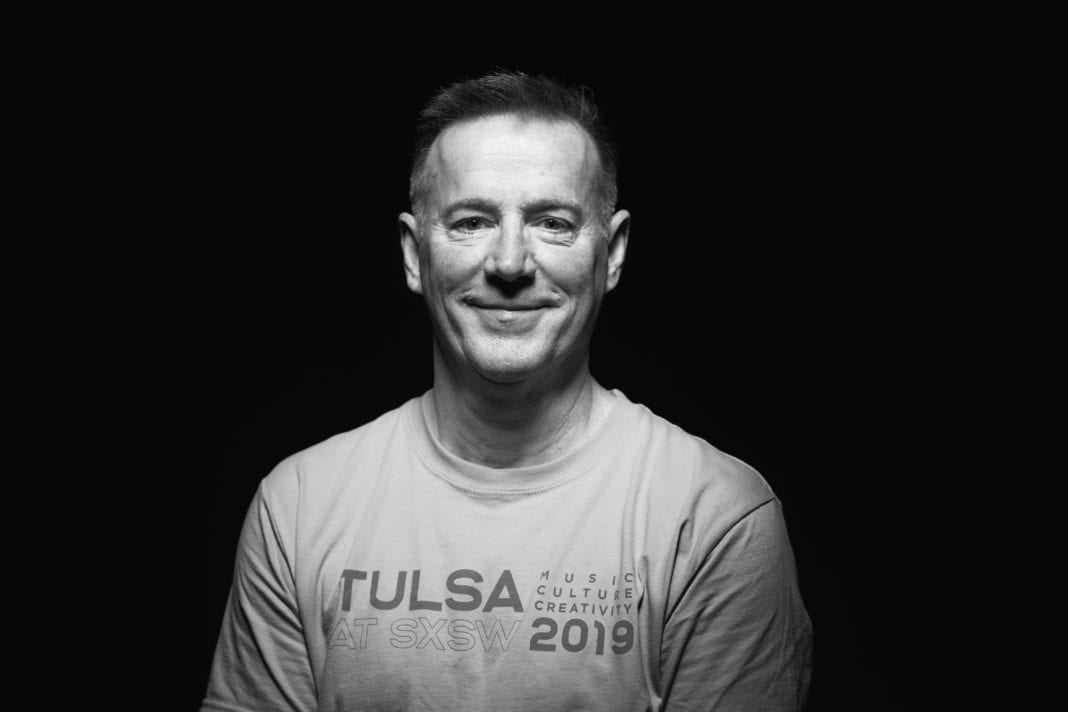As the president of Tulsa Regional Tourism, Ray Hoyt spends his work days creating long-term strategies for tourism development, sales and programming for VisitTulsa; the Tulsa Sports Commission; and the Tulsa Office of Film, Music, Arts and Culture within the regional chamber. His tenure began in 2010, and for the last decade, he’s worked to promote and sell Tulsa as a destination to people around the world.
Currently, Hoyt is working on the implementation of Tulsa’s first tourism-based improvement district, while also working on multiple vision projects like the USA BMX National Headquarters, the Cox Business Convention Center renovation, and destination development strategies for the future. We caught up with Hoyt and got his thoughts on …
… his day-to day.
Like many others in the tourism industry, ‘normal days’ are challenging to define, as we really serve so many stakeholders. Over the last couple of years, I’ve focused on running the business rather than doing it. That shift required attention to building out my leadership team and getting people in the right places organizationally. My leadership style is on the inspirational and servant end of the spectrum – I like to dream big and think about the future and how that can be turned into vision and then a reality. I have a very talented team that is dedicated and committed to turning a lot of those dreams and visions into reality.
… COVID-19’s
impact on tourism.
While the pandemic landed a huge blow to tourism in Tulsa, and we’ll be recovering for many months, I am grateful to say I believe we can recover in months and not years. Our team focused on continuing to sell the future, and on the shoulders of our CARES Campaign, “Tulsa Safely Recovery” Pandemic Partnership, we were able to relocate a record-breaking ten events to Tulsa in-year and safely held more than 70 events in Tulsa in 2020. The mantra we seized early in 2020, when things started closing in March, was “Crisis is the Mother of Innovation.” We lead with that for every discussion and it has served us well.
We also prioritized supporting our creative class and cultural scene during the pandemic. This is where our thinking helped us re-imagine and create opportunities for live music, film productions and sporting events that happened through the lens of social distancing, temperature checks and many more elements that were foreign concepts ten months ago, but common place today.
… making the city a professional sports hub.
As you’ve probably seen, we’ve successfully attracted some serious sporting events to Tulsa lately. From Ironman choosing Tulsa as its national championship site to being selected to host the 2023 NCAA Wrestling Championships, we have a winning combination with our top-notch facilities, services and partners for major sports events.
Long-term, Tulsa will need to work closely with the USL Soccer Club ownership, as a stadium should be a public/private partnership in the coming years for downtown. There is a master plan for the Arena District, and this is important, as Tulsa has a plan to follow and act on for the future. Even though it’s a very long-term vision, its like many things in Tulsa – when the community decides to make it a reality it will happen … but on Tulsa time!
With USA BMX opening their global headquarters in Tulsa next year, we look forward to enjoying the expansion of that sport in our region. We also believe that BMX will add to the fabric of cycling and extreme sports already being hosted here.
… Tulsa in the next 10-15 years.
I like dreaming and visioning, as it makes me excited for the future, imagining Tulsa as a city for all. The Arena District is going to be critical to filling out our downtown, and it will be hard, but worth it. The Arkansas River corridor could very well be the development area that brings aquatic activity to our market, which could spur tourism investment and development and bring millions of new visitors to our community.
…proudest moments.
I love to plant ideas and visions and then educate and advocate community leadership to support these opportunities. The creation of the private investment fund for tourism-specific activity has been a game changer, not only for Tulsa, but changing how funding is thought of in our industry. Thanks to dedicated board members and supportive corporate citizens in Tulsa, we have raised over fifteen million dollars in three campaigns to directly support tourism development and event attraction, which has directly changed Tulsa as a destination.
The creation of the Tulsa Office of Film, Music, Arts and Culture six years ago was pretty amazing. The other one is clearly the successful Vision 2025 campaign, which lead to USA BMX relocating to Tulsa. My other notable moment is leading the effort to get the Tourism Improvement District (TID) legislation passed at the state level, and then leading the effort with hoteliers in Tulsa to be the first city to pass a TID ordinance in Oklahoma.
… his dedication to the City of Tulsa.
When I was recruited to Tulsa, it was originally to just lead the Tulsa Sports Commission, and that changed shortly after arriving. In early 2011, I took the leadership role for both sports and tourism organizations. In our typical recruiting trip to Tulsa, I met several board members and community leaders, and it was clear they wanted change and growth in Tulsa as a destination and in the sports market. I was impressed with Tulsa’s existing assets, and there was the desire to improve what we currently had, and then what to build with a renaissance on the horizon for Tulsa – and that excited me to be a part of that. I love change, making a difference and inspiring staff and the community to go for it! Imagine if we didn’t go for it? Things like BMX, Ironman, Bassmaster, NCAA basketball, NCAA wrestling, Big 12 Wrestling Championships – to mention a few – may have never happened here over the past ten years.


























